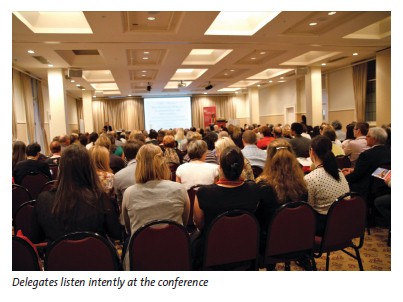Karen Coghlan, Senior Media Coordinator

The 3rd annual APS College of Educational and Developmental Psychologists (CEDP) conference, themed ‘Theory to practice: Positive development and wellbeing’, was held in November 2011 in Melbourne with over 250 delegates attending. The aim of the conference was to promote a broad spectrum of research in the sector, from psychosocial wellbeing through to learning, literacy and numeracy, and to highlight the College’s commitment to evidence-based practice and its role in promoting the best research and latest developments in the field. Day one of the conference showcased three outstanding keynote addresses amongst a plethora of peer reviewed paper sessions that reflected high scholarly standards. Professor Nancy Mather from the University of Arizona skilfully leavened her dissertation on intelligence theory with humour, translating complex theoretical underpinnings into practitioner-friendly interventions. Professor Timothy Sharp of the Happiness Institute gave attendees an entertaining look at positive psychology and what it means to be happy. The laughter echoing throughout the room was testament to Professor Sharp’s engagement with his audience. After discussing the variables that make a happy life, participants took away tools for long-term happiness for both personal and professional use. Professor Nick Allen of the University of Melbourne discussed the complexities of adolescent emotional development in the context of peer and family relationships. Research in this area is subject to constant change as new technologies emerge. In the true spirit of the conference theme Professor Allen’s presentation assisted the understanding of brain development and the implications for future interventions. The second day of the conference featured two successful workshops that delivered cutting edge applied research with practice orientated implications for educational and developmental practice in Australia and beyond. The conference was chaired by Erica Frydenberg, and Program Chair John Roodenburg.
The CEDP conference offered more than the chance to accumulate continuing professional development hours or listen to outstanding speakers. Many enjoyed the networking opportunities the days afforded, which continued into the highly successful conference dinner. Each year the annual conference further promotes connections between a growing group of students, professionals and psychologists interested in educational and developmental psychology.
Exciting plans are underway for the 4th annual conference of the College later this year.
Kelly O'Brien MAPS, CEDP Conference Organising Committee
EDUCATING THE COMMUNITY ABOUT EDUCATIONAL AND DEVELOPMENTAL PSYCHOLOGY
To demonstrate the contribution educational and developmental psychologists can make to the community, the media campaign for the conference focused on the keynote speakers, in particular, the US keynote, Professor Nancy Mather, a specialist education expert. The aim was to disseminate key findings of community benefit from the keynote presentations, including information on how to maximise educational opportunities and outcomes for children with learning disorders.
Much of the media coverage also cited the College as the host organisation, thus highlighting its role in promoting research in the sector and promoting best practice across
the discipline.
Media highlights
- The online parenting publication, Happy Child, interviewed Professor Nancy Mather for an in-depth feature story on learning disorders.
- Professor Nancy Mather was interviewed by ABC Western Queensland.
- Professor Tim Sharp appeared on 774 Afternoons, with Richard Stubbs.
- Professor Tim Sharp was interviewed by the national radio current affairs show, The Wire.
- The Geelong Advertiser ran stories on all the keynote speakers.
Disclaimer: Published in InPsych on February 2012. The APS aims to ensure that information published in InPsych is current and accurate at the time of publication. Changes after publication may affect the accuracy of this information. Readers are responsible for ascertaining the currency and completeness of information they rely on, which is particularly important for government initiatives, legislation or best-practice principles which are open to amendment. The information provided in InPsych does not replace obtaining appropriate professional and/or legal advice.